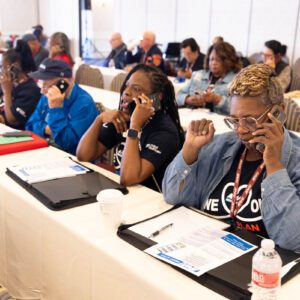January 23, 2020
Labor News
(This article first appeared in the January/February 2020 issue of the American Postal Worker magazine)
Amalgamated Transit Union Strikes Lead to Victory Against Privatization
On Oct. 24, over 120 members of Amalgamated Transit Union (ATU) Local 689, workers at the Cinder Bed Road Metrobus Garage in Lorton, VA, began a strike against Transdev, the private French corporation contracted by the Washington Metropolitan Area Transit Authority (WMATA) to run the facility. The work stoppage shut down or reduced service on WMATA’s Metrobus routes used by around 8,500 riders each day.
More than 500 Fairfax Connector bus drivers represented by ATU Local 1764 began their own strike against Transdev on Dec. 5, shutting down bus service for another 30,000 in Northern Virginia.
The Cinder Bed garage and the Fairfax Connector routes are two of multiple operations contracted out to private corporations in the region since 2017, in an effort to cut labor costs and benefits. Other planned privatizations included Phase 2 of WMATA’s Silver Line expansion, a project to connect the subway to Dulles International Airport.
The workers at outsourced operations drive public buses for public transit authorities, yet only receive wages at half the hourly rate of in-house employees, also receiving drastically worse health care and retirement plans.
On Dec. 9, Fairfax Connector drivers ended their work stoppage, returning to the bargaining table after Transdev committed to negotiate in good faith. On Dec. 13, after nearly two months with Cinder Bed workers on the picket line, ATU Local 689 and WMATA management came to an agreement to take effect when the current contract between ATU Local 689 and WMATA expires on June 30, 2020. The four-year agreement bars further privatization of the WMATA system, including the Silver Line expansion.
The agreement also mandates that management bring alreadyoutsourced services back in-house, including the Cinder Bed garage. By 2021, Cinder Bed workers will become full WMATA employees, and receive the same wages and benefits as their fellow in-house workers.
As this issue goes to press, workers at the garage remain on strike. Though they have won a commitment from WMATA to take over the garage within four years, workers remain steadfast in their demand for equal pay for equal work while they remain under Transdev management.
1/23/2020 Update:
On Jan. 14, ATU Local 689 announced they had reached an agreement with Transdev management to end the Cinder Bed strike. On Jan. 16, Cinder Bed workers overwhelmingly approved the agreement, ending the strike after 84 days. The agreement “includes improved health care and retirement plans along with substantial wage increases,” according to the Washington Post.
Southern Poverty Law Center Workers Vote to Unionize
Founded in 1971, The Southern Poverty Law Center (SPLC) is one of the most prestigious and influential civil rights organizations in the country, with a long history of important investigative and legal work. However, when SPLC workers announced their intent to unionize with the Baltimore-Washington NewsGuild in November, management refused to voluntarily recognize the union and hired a union-busting law firm. Workers held firm, and in an NLRB election held in December won their union by a vote of 142-45.
SPLC workers’ victory is a positive development in a year of major upheaval at the nonprofit. Cofounder and chief trial lawyer Morris Dees was fired following allegations of sexual harassment and discrimination, and President Richard Cohen resigned in March. Now, workers have the power to change the culture of the organization from the work floor up. The new bargaining unit encompasses staffers at 11 SPLC offices in five states (Alabama, Florida, Georgia, Louisiana, and Mississippi) and Washington, D.C.
“At its core, this was a racial justice movement,” said Danielle Davis, an attorney in the New Orleans office. “That was part of the reason we won by such an overwhelming number. We believe in racial justice. We believe in gender equity. We believe in equal access for people who are differently abled.”
“Labor organizing is a tool by which we can ensure equity and inclusion in our workplace,” Davis said.
Miners Secure Pensions and Retirement Health Care
For the past decade, tens of thousands of United Mine Workers of America (UMWA) members have rallied and lobbied members of Congress to protect the miners’ pension fund that, if not addressed, would have reached financial insolvency by 2022. UMWA members held dozens of rallies and peaceful, civil disobedience demonstrations across the country, as well as several hundred meetings with members of both houses of Congress, to raise awareness and pressure coal companies and Congress to “Keep the Promise” of retirement health care and pensions to almost 100,000 retired miners.
On Dec. 17, 2019, leaders in both houses of Congress came to an agreement on a new federal spending bill including the Bipartisan American Miners Act, transferring funds to make sure the pension plan will not run out of money. The legislation also secured health care for over 14,000 miners. The bill, as part of the end-ofyear federal spending bill, was signed into law on Dec. 20.
The UMWA pension fund has been one of the country’s hardest hit retirement funds over the previous decade. The 2008 financial crisis eliminated a large amount of alreadyaccrued retirement savings, and in the ten years that followed, the number of workers paying into the fund sharply declined as the country became increasingly reliant on natural gas instead of coal. Many of the largest coal companies declared Chapter 11 bankruptcy in 2010-2020, using bankruptcy court to shed their responsibilities to their retired workers.
“I want to thank the thousands of UMWA members who have written the letters, made the phone calls, gone to the rallies, and walked the halls of Congress to keep this issue front and center,” said UMWA President Cecil Roberts. “We would not be at this point without their efforts.”
UNITE HERE Local 11 Members Use Leverage from Presidential Debate to Win New Contract
On Dec. 13, 150 UNITE HERE Local 11 Members informed Democratic presidential candidates of their plans to picket before the debate scheduled at Loyola Marymount University (LMU) on Dec. 19. Local 11 had attempted to negotiate a new contract with Sodexo, LMU’s contracted food service operator, for nine months. Workers demanded livable wages and affordable health insurance, but the company refused to bargain in good faith.
However, in response to the threat to greet candidates with a picket line, all seven debate participants announced their plans to boycott the event until a fair agreement was reached.
The use of leverage by Local 11 workers and the resulting show of solidarity from the candidates spurred the Democratic National Committee (DNC) and its chairman Tom Perez to bring Sodexo to the table and meet the workers’ demands. The parties came to an agreement early on Dec. 17, with the membership ratifying the three-year contract later that day. The contract includes increased wages, lower health care costs, and stronger job security.
“I am thrilled that we were able to reach an agreement, and that the candidate debate can continue as scheduled,” said Angela Fisher, prep cook at Loyola Marymount University. “I am homeless, and knowing that I will be making a better wage because of this new contract gives me the hope to put a roof over my head.”



